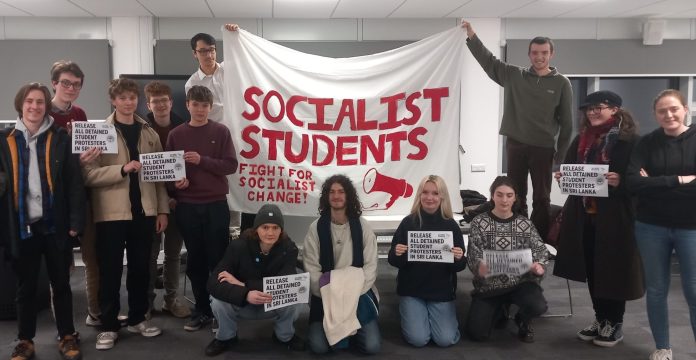Séamus Smyth, Socialist Party East Midlands youth organiser
The Aragalaya (Sinhalese for “struggle”) protests in Sri Lanka, fuelled by a cost-of-living crisis, inspired students and young people across the world. People saw images of masses of protesters taking over the presidential palace and swimming in the presidential pool! These protests led to the resignation and flight of the president Gotabaya Rajapaksa and his family.
But his replacement, President Ranil Wickremesinghe has announced more cuts and austerity measures. It is obvious that this new government holds no solution for the people of Sri Lanka. Rather than changing the economic situation after he was brought into power, he has intensified the crisis through further mass repression and financial instability. He is representing the interests of the bosses not the mass of workers and poor.
Ultimately, this reflects the rottenness of capitalism. A crisis of a profit-driven system where the vast majority of wealth is accumulated by a few, and the inflating prices of goods means that people can’t afford food, fuel, or energy. And one in which former colonial countries are shouldered with massive debt from the advanced capitalist countries, and the masses pay the price.
Just like Sri Lanka, workers and young people here in Britain and around the world are experiencing a cost-of-living crisis. In Britain, one in ten students has to rely on the use of food banks as they enter third level education.
In Sri Lanka, after the protests ebbed, the government turned to repression. Many have been detained under the draconian Prevention of Terrorism Act (PTA). Among them, Wasantha Mudalige, convenor of the Inter University Students Federation (IUSF), the largest student’s union in Sri Lanka, has been detained for over 140 days.
Socialist Students has been campaigning in solidarity with the movement in Sri Lanka and those facing repression. We want to learn the lessons from the struggle to forward socialist ideas for workers and students fighting against brutal repression and the economic crisis.
We have organised stalls and public meetings where we put forward student and trade union motions which called for the release of protesters detained under the PTA, the repeal of all oppressive laws, and to fight for the freedom of assembly, free speech and protest.
At Nottingham Trent University, we organised stalls, and mobilised on campus when the IUSF called for an international day of action on 9 November.
Prasad Welikumbura, one of the leading organisers of the movement and a member of the United Socialist Party, came to Nottingham and Leicester as part of a national speaking tour and described how the movement was developing and how the government attempted to suppress the protests. Parallels can be drawn between the Tories’ plans for new anti-strike laws to try and head off the movement here.
Socialist Students will continue to campaign in solidarity with the workers and students in Sri Lanka. With further public meetings around the country, we will continue passing motions and raising this in the movement. The solidarity campaign will be a feature of the upcoming Socialist Students conference on 18 March.
We say that the only way for workers and young people to have any future, whether in Sri Lanka, Britain or internationally, is to fight for socialist change, where society can be free of continuous economic hardship and oppression.







